Wouter Verbraak: Learning and Improving
Published on June 18th, 2015
The 2014-15 Volvo Ocean Race had started the second of nine legs on November 19, taking the 7-boat fleet on a 5,220 nm course from Cape Town, South Africa to Abu Dhabi, UAE. But on November 29, the race narrative took a dramatic turn when Team Vestas Wind went aground on a reef in the middle of the Indian Ocean.
What followed was the rescue of the crew from the Cargados Carajos Shoals, the salvage of the boat, its ensuing re-build, and ultimately the team’s first sail on May 30 in time to compete in the final two legs of the race. But there was also an investigation into the cause, and while there were several contributing factors, navigator Wouter Verbraak shouldered the bulk of the blame.
Released from the team on January 23, Wouter used the time since the accident to write the book, Beyond The Break: Lessons from a life in high performance teams. Wouter tells the story of the accident from the center of the storm, providing the emotional context from a man who made a major error. But Wouter also uses the opportunity to share his experiences in the sport, and the lessons gained. The book, which provides a fascinating look into the world of elite racing, is now available at Amazon.com.
Here’s an excerpt from the book following the accident:
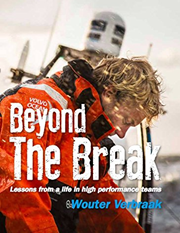 Dark feelings are starting to rise. I get angry at myself. How could we not have seen the reef? Why did I not zoom in more? I know the electronic charts can have problems with showing details at a larger scale, but missing a complete atoll with reefs and islands?
Dark feelings are starting to rise. I get angry at myself. How could we not have seen the reef? Why did I not zoom in more? I know the electronic charts can have problems with showing details at a larger scale, but missing a complete atoll with reefs and islands?
Exhausted, I sit down on the tubes of the liferaft that we dragged up the beach. It all comes out now. A maelstrom of thoughts keeps going through my head. How did we not see this? What now? How do the others feel? What do the others think of me? With my hands in my head, I feel my eyes well up. I feel like curling up into a ball.
I just want to get out of here, and be home with Kristine and Nicklas (wife and son). Away from all this. All the hard work of the last months, gone. All the sacrifices that we as a family have made for me to do well in the race, chase my dreams, are now done in vain.
I sit there for I don’t know how long. When I look up, I see that the sun is touching the horizon. With the emotions let out, I am able to think a bit clearer. I have hit rock bottom. I am on the rocks. How to move forward from this? There is only one way. I need to gather the courage to stick my hand up. Admit that I made a mistake. Apologize to the team. Don’t be a coward. Step up.
Scuttlebutt editor Craig Leweck caught up with Wouter for this update…
Is it hard now to be a spectator to the Volvo Ocean Race?
I have probably been the race’s biggest fan ever since I was 13 and I am currently at the stopover in Holland and really enjoying being part of the audience to this wonderful spectacle, though of course, I would have liked it even more if I had been on board.
How did the accident personally affect you?
I was overwhelmed by all the support I have received and I really appreciate all the great friends and colleagues I have even more now. I also see that there are aspects we can do better in Ocean Racing and I am working hard to share the lessons I have learned. Hopefully a lot of this comes through in the book.
What have you been doing since the accident?
After a period of rest and reflection, and writing a lot – I found that my passion for racing is as strong as it has ever been, I have returned to doing exactly that. I have been sailing class 40s, Open 60s and trimarans with great enjoyment.
Why did you write the book?
Amongst one of the many messages of support after the grounding, I received one from a top executive in the airline industry that really resonated with me and inspired me to write.“In a crisis situations, the leader must stand up and set the tone. He should work along the thought process of We made some mistakes which we intend to share with others so that this situation is not repeated. Greatness is not gained by trying to avoid mistakes by not doing anything, but to learn and improve.”
Have you recovered from this accident?
I would say so. When friends and colleagues make jokes, I am able to join them in laughing. However, the goal remains to share the story to avoid this from happening again, so it is certainly not forgotten.
What has been this accident taught you?
There are many lessons to be learned, many of which are addressed in the Volvo Report and changes are happening to charts, rules etc which is really good to see. On a personal note, I have amongst other things, learned that if you put your hand up, you will get a lot of support and you will be able to move on and improve as you are learning from what went wrong.
Here’s another excerpt from the book:
Chapter 1 – The Grounding
The sound of crashing carbon is deafening as it is amplified through the interior of the hull.
I’m bolt upright in my bunk. Did we drop the rig? Did we hit a whale? I jump out of my bunk and see Salty in his underpants. The white of his eyes say it all.
“There’s a rock!” I hear from on deck. I look at the little chart plotter in the navigation station. I can’t believe what I see. We are on a reef. A big wave lifts the boat up and we crash down violently.
Chris comes down and shouts. “Which way off Wouter?” “South-East, we need to get off to the SE.” There is lots of water sloshing around in the back of the boat. We need to close the waterproof hatch I think. The boat is picked up again. I brace myself against the bulkhead and we land with another loud crash. Just getting to the water proof door is a challenge, but two smashes later, I manage to get hold of the hatch and pull it closed.
The motor is started and the noise is deafening as the guys on deck try to get off. Zooming in on the electronic charts on the laptop, I can see that we make no progress. We are being thrown backwards further onto the reef. “Reef? How can there be a reef?” We are in the middle of the ocean? How can we not have seen this?” No time for this, we need to get out of this. We need to call for help.
On deck I can hear the grinders going. “We are going to try and lift the boat over on the keel to get off.” I hear Chris say. The engine is revving wildly again as we try to cant the keel. No movement. We are stuck.
“Hello this is Race Control.” It is Dan. Thank God it is Dan. A familiar voice. Dan was with us at the Safety at Sea training in Newcastle. I have gotten to know him well over the last months. “Dan, it is Wouter from Vestas. We hit a reef.” Facts, facts, facts goes through my head. Only communicate facts. “Both rudders and the daggerboard are broken and there is water in the aft compartment. We closed the water tight hatch. We are unable to get off the reef.”
My heart is pounding. I need to take deep breaths, keep calm. A reef? How can there be a reef? Think.
The others in the fleet are miles away, and we need to get immediate assistance to get off. Where are we? Zooming in further all I can see is the green colour of a drying reef and some tiny islands. Who would be here? We are in the middle of nowhere. We have to give it a try. Mayday call. We need to make a Mayday call. Think again. MIPNANO. MIPNANO. That is it. I write the letters vertically down on the note pad. Mayday, Identification, Position, Nature of incident, Assistance required, Number of people on board, Over. I silently say my Thank you’s to the instructor at the VHF training.
I grab the VHF microphone. We get lifted up again. Hold on tight. Another crash and the cracking of carbon. This is not good. We are in serious trouble. Keep calm. Deep breath. Remember: Mayday Call, then Mayday message.
“Mayday Mayday Mayday, this is sailing yacht Vestas Wind, Vestas Wind, Vestas Wind.” OK, done. Another deep breath, now the Mayday message. Follow the letters. MIPNANO. “Mayday, this is Vestas Wind, SE part of reef on Cargados Carajos Shoals, grounded, 9 people on board, need immediate assistance , Over.”
I let go of the button. That was terrible. Absolutely terrible. I stumbled over my words and mixed up the message completely. Terrible. Will anybody answer? Please, please, let somebody answer. I only once made a Mayday call before, and then there was no answer at all. Silence.
Focus. Deep breath. Try again. “Mayday Mayday Mayday, this is sailing yacht Vestas Wind, Vestas Wind, Vestas Wind. Mayday, this is sailing yacht Vestas Wind, we are on the SE part of reef on the Cargados Carajos Shoals in position 16 41.9 S 059 31.8 E, we are heavily grounded, we need immediate assistance to get towed off, 9 people on board, Over.” Will there be any answer this time?
“Sailing vessel Vestas Wind, this is fishing vessel Elisa.” A reply! We got a reply! A fishing boat surely is big enough to come and help us, tow us off, get us from this horrible reef. Get us safe.
I can feel my shoulders drop in relief, but that feeling evaporates as quickly as it arrived. The fishing boat says they can’t come until the morning. It is too dangerous. Not until the morning? It is pitch black. What is the time? More important what is the local time? When is sunrise? A few button pushes on the chart plotter show sunrise at 01:30 UTC. What is the time now? 15:43 UTC…That is long…twenty four minus fifteen is nine plus one is ten. Ten hours? Ten hours until they can come? Ten hours being smashed around on the rocks? The boat is never going to hold.
Additional information about Wouter Verbraak can be found at his website: www.wvsailing.co.uk
Photos below taken shortly after the grounding


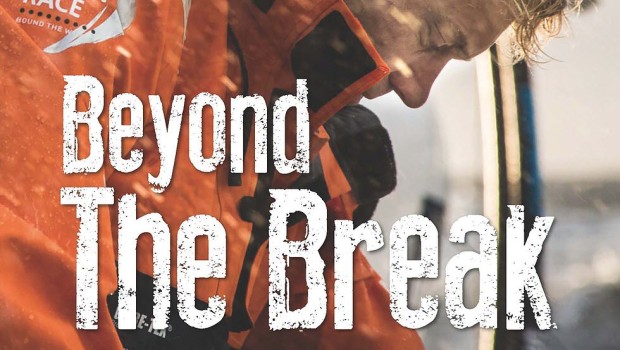


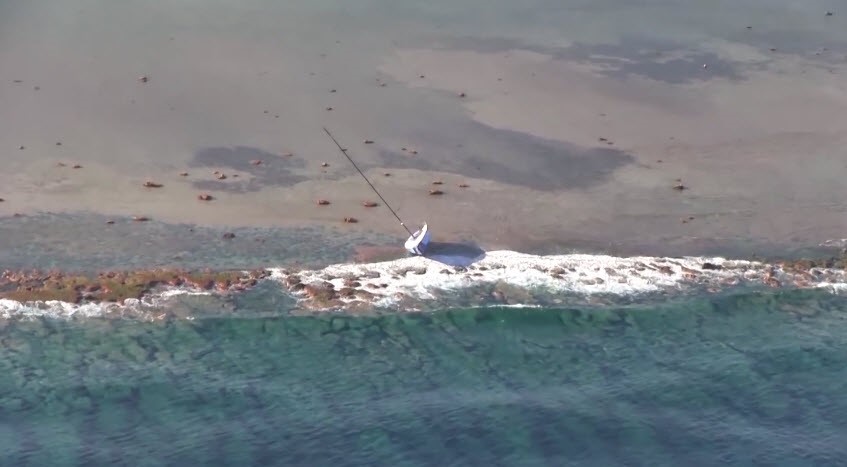

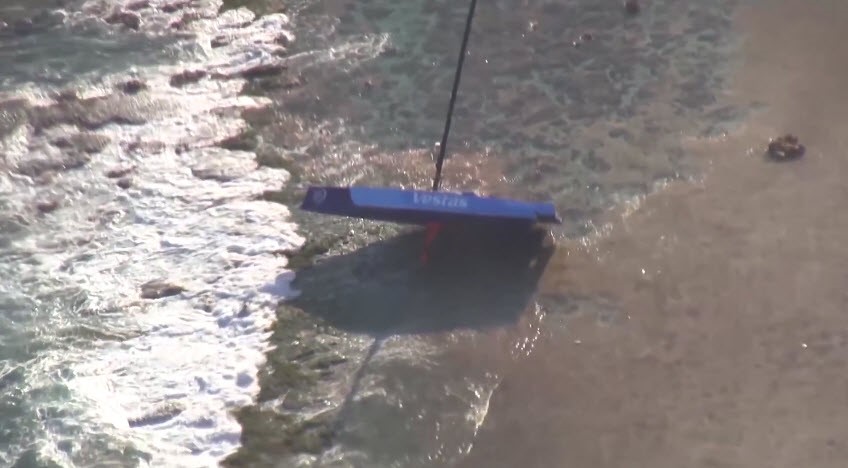
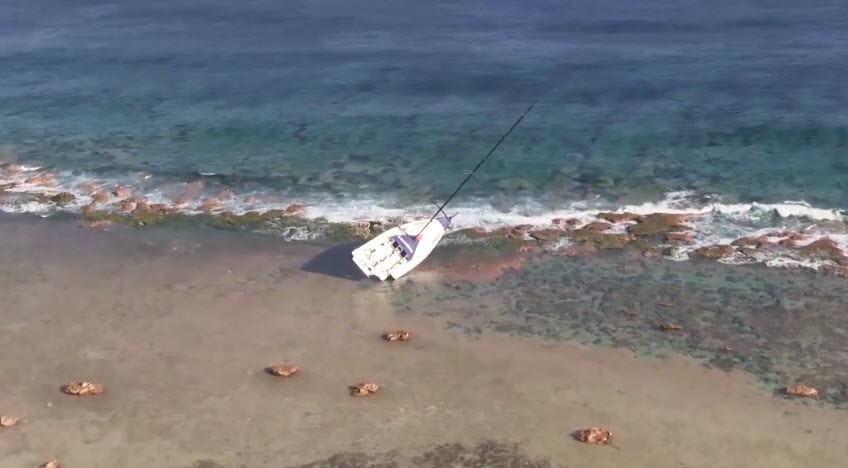
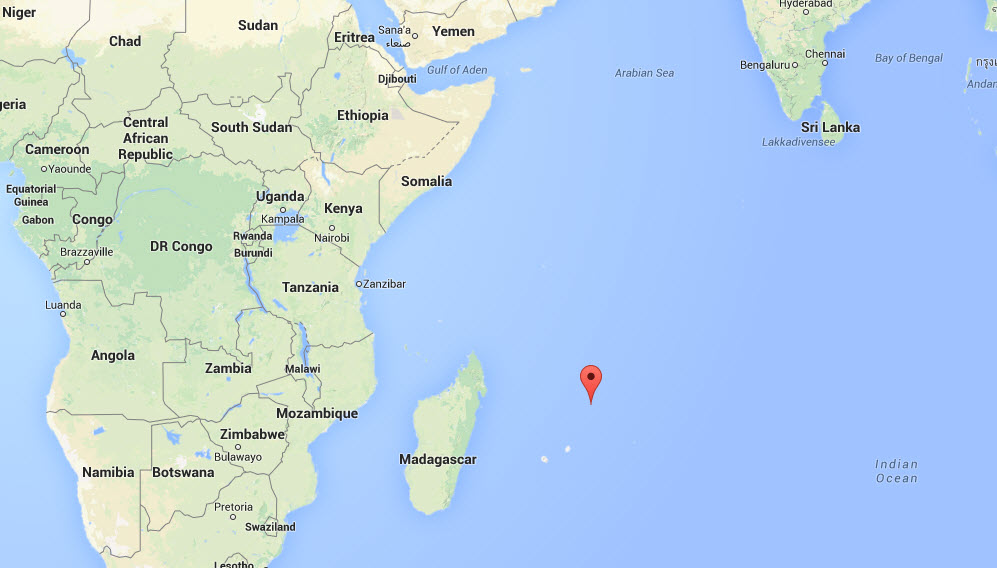
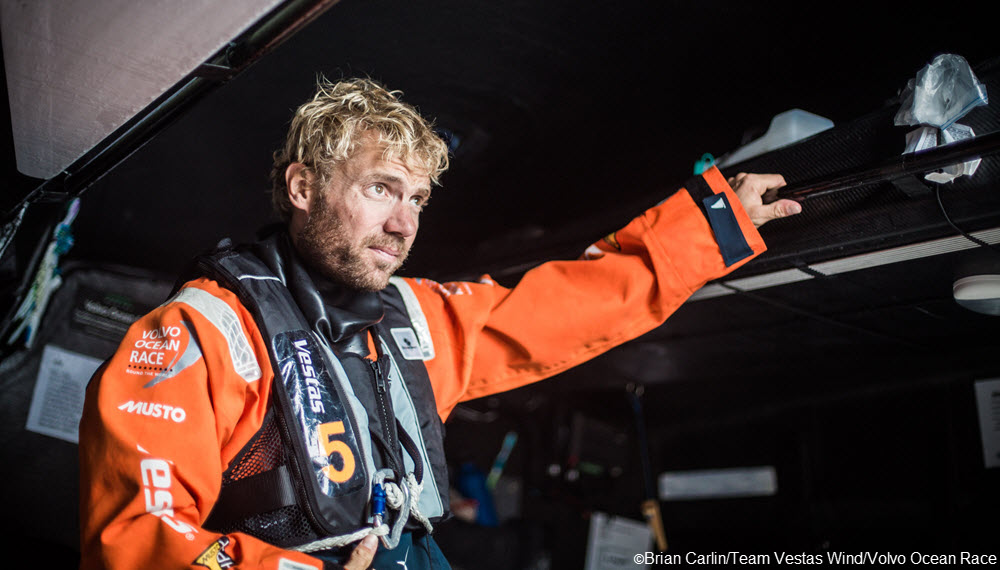

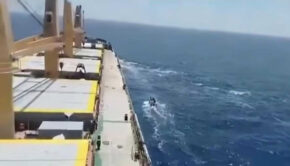
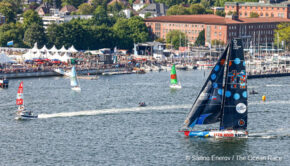
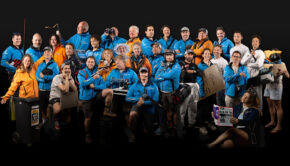
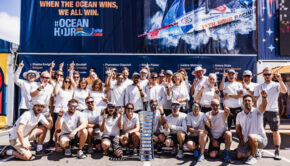
 We’ll keep your information safe.
We’ll keep your information safe.